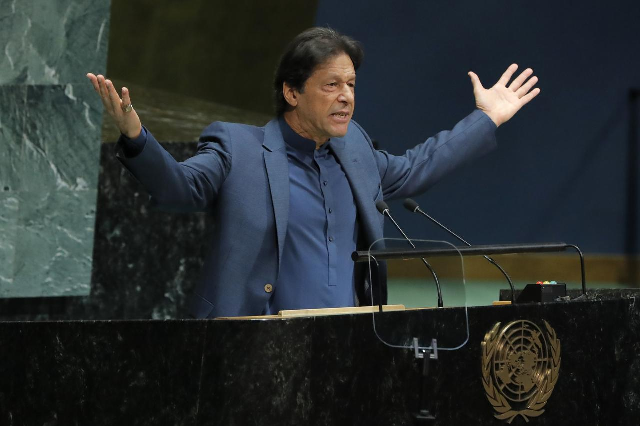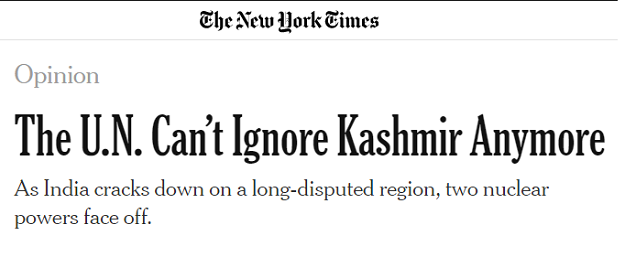
Indian Occupied Kashmir (IOK) has been seething with rage since the Hindu nationalist prime minister of India revoked the semi-autonomous status of the disputed Himalayan territory on August 5, clamping curfew in the Muslim-majority valley and detaining thousands of people, including politicians, lawyers and journalists.
IOK remains literally cut off from the world since – with no phone or internet service while tens of thousands of Indian troops are running amok, detaining, beating and torturing people with impunity.

In an editorial, The New York Times referred to Prime Minister Imran Khan’s speech at the UN General Assembly in which he implored members to persuade India to lift its siege of Kashmir because failure to do so … could result in a war between the neighbours.
Modi, who didn’t address the issue in his UN speech, said at a Houston gathering earlier that his IOK move meant “people there have got equal rights” with other Indians now.
“That’s an absurd assertion to make about a state in the world’s largest democracy that’s essentially under martial law,” writes NYT in its editorial.
“If the UN doesn’t speak about it,” Imran Khan told NYT’s editorial board the day before his speech, “who is going to speak about it?”
“He [Imran] may need to keep looking. Resting any hopes on the United Nations seems futile, given the approach it has taken to the dispute in recent decades,” the NYT writes in the editorial.
It further says that “the United Nations’ lack of resolve is a sad sign of the dysfunction in international diplomacy as American leadership declines and divisions among world powers grow”.
President Trump has offered to mediate, but his warm relations with the increasingly autocratic Mr. Modi — Mr. Trump attended the Houston fan fest — hardly make him an honest broker.
Countries are unwilling to risk crossing Mr. Modi and losing access to India’s huge market. Pakistan is economically weak. It also damaged its standing, and its position on Kashmir, by supporting militant groups that have attacked Indian troops, stirring a conflict that has torn Kashmir apart for decades, added the US publication.
"Mr. Modi claims his clampdown would resolve that conflict and bring normality and development to Kashmir. But it seems more likely that it will only heighten tensions and make life more miserable for Kashmiris."
The NYT further stated that the Indian prime minister "could avoid disaster by lifting the siege, relaxing movement across the border between zones of the Kashmiri region that are held by India and Pakistan, releasing political prisoners and allowing independent investigators to look into alleged human rights abuses. Perhaps India’s Supreme Court, responding to various legal petitions, could even order him to reinstitute autonomy".
"Those hopes are almost certainly in vain."
At least, in their last few crises, India and Pakistan demonstrated restraint. But it is easy to see how tit-for-tat actions can begin to escalate, said the publication in reference to escalating tensions between the two nuclear-armed neighbours.
"The Security Council should make clear that it opposes Mr. Modi’s brutal tightening of India’s control on Kashmir. While Mr. Modi may think he can control this volatile conflict on his own, he almost certainly cannot," concluded the NYT editorial.

















COMMENTS
Comments are moderated and generally will be posted if they are on-topic and not abusive.
For more information, please see our Comments FAQ